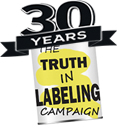LABEL LIES
Basic Facts (things the "glutes" don't want you to know)
This is How the "MSG is Safe" Game is Played
Propaganda
 The Architect of it All
The Architect of it All
Andrew G. Ebert deserves special commendation. This man is cool. This professionally respected Ph.D. pharmacologist and toxicologist certainly knows that his product, monosodium glutamate, is toxic. Yet he promotes it as a harmless food additive. And coolest of all, he has the charm, the charisma, the magnetism, and the financial resources to get much of the world to accept his rhetoric.Ebert also knows how to keep a secret. Nowhere in the reports of double-blind studies that he supervised was there mention of the fact that his placebos were laced with neurotoxic aspartic acid in aspartame. Could he not know that the monosodium glutamate he is promoting lies at the root of the obesity epidemic? That, too, seems to be a secret.
As a Ph.D. pharmacologist and toxicologist, Ebert would know that the toxic free glutamic acid in monosodium glutamate fed to a pregnant female passes the placental barrier and causes brain damage in the unborn infant. Ebert would know that nursing mothers who ingest monosodium glutamate pass the toxic free glutamic acid in that monosodium glutamate to their nursing infants. Ebert would know that the toxic free glutamic acid that comes from monosodium glutamate in mother’s milk causes brain damage in the neonatal and/or immature infant being nursed. And Ebert would know that the brain damage caused by ingestion of monosodium glutamate will occur in the area of the hypothalamus that regulates human reproduction and human obesity – that monosodium glutamate fed to the unborn and the very young lies at the heart of human reproductive disorders, and at the heart of the human obesity epidemic.
From the beginning, Ebert has been key to the operation of Ajinomoto’s International Glutamate Technical Committee (IGTC), recruiting researchers to carry out research that was designed for them. First there were the animal studies with researchers failing to find brain damage. The industry-sponsored researchers said they were replicating studies wherein MSG-induced brain damage had been found, but they did not do so. Instead, discussion was phrased to suggest that studies were "replications," and the conclusions were based on what was said, not on what was done. Subjects, test materials, overall procedures, and/or methods of analysis differed from the studies being "replicated." For example, although it had been established that brain lesions could not be identified if examination was not done within 24 hours after insult, glutamate-industry researchers routinely examined the brains of test animals after 24 hours had elapsed. They also used inappropriate methods and materials for staining the material they were examining.
Then came the human studies wherein placebos were laced with aspartame. And with each of these badly flawed studies, Ebert’s researchers, Ebert, and Ajinomoto, would proclaim that a new study had demonstrated that monosodium glutamate is a harmless food additive.
During his reign at the IGTC, Ebert was the personification of the IGTC, and his influence could be felt at every level. He had served on the FDA Food Advisory Committee; the Grocery Manufacturers of America (Technical Committee on Food Protection, the Codex Subcommittee on Food Additives and the GRAS-FASEB Monograph Committee); the National Food Processors Association; the Institute of Food Technology (Technology Toxicology and Safety Evaluation Division, and Scientific Lecturer); the National Research Council of the National Academy of Sciences Assembly of Life Sciences (Food and Nutrition Board: the Committee on Food Protection, and the GRAS List Survey); the American Medical Association (Industry Liaison Panel); the FAO/WHO Codex Alimentarius Food Standards Program as an Industry Observer; and the International Food Additives Council as Executive Director. Ebert had access to those at the FDA charged with the safety of food, and had them approve some, if not all, of the protocols used in his double-blind studies. Protocols that called for use of aspartame in placebos.
Both the IGTC and The Glutamate Association function (or functioned) under the umbrella of the Robert H. Kellen Company. Ebert provided scientific and technical expertise for programs of many associations managed by The Robert H. Kellen Company. From time to time Ebert was listed as an officer.
Ebert has also been an active member of the Institute of Food Technologists (IFT). But he is not the only IFT glutamate-industry spokesperson. Daryl Altman, M.D., a spokesperson for the glutamate industry, worked for former IFT president Al Clausi, Vice Chairman of Allerx, Inc. and its medical affiliate, The Food Allergy Center. Altman often spoke publicly about the safety of monosodium glutamate, often with Steve Taylor. The IFIC promoted them as speakers without mention of the fact that they represented the glutamate industry. L.T. Chiaramonte, M.D., who co-authored work for the IGTC with Altman, has served on the medical advisory board of The Food Allergy Center.
Ebert no longer sits as chairman of the IGTC. In 2009, we came across his name on an IGTC Executive Committee list, but have seen little more about him since then (1). His move from the glutamate industry limelight coincided with our posting information on The Truth in Labeling Campaign web site about his role in designing the IGTC’s “scientific” studies and supplying aspartame-laced placebos to his researchers. Following Ebert's departure from center stage, we saw the names of Takeshi Kimura and Yoshi-hisaSugita, Ph.D., associated with the IGTC. Both came from Ajinomoto.
Some time ago, we goggled Andrew Ebert just to see what he’s been doing lately, and at the time came across a bio that listed him as a consultant to The Kellen Company which shared offices with the IGTC, but failed to mention any association with the IGTC. We also found that he then headed his own consulting firm (EMT, Inc.) and was still active in groups such as the U.S. Pharmacopeia (USP). According to their web page as it appeared on June 29, 2010:
“The United States Pharmacopeia (USP) is a non–governmental, official public standards–setting authority for prescription and over–the–counter medicines and other healthcare products manufactured or sold in the United States. USP also sets widely recognized standards for food ingredients and dietary supplements. USP sets standards for the quality, purity, strength, and consistency of these products–critical to the public health. USP's standards are recognized and used in more than 130 countries around the globe. These standards have helped to ensure public health throughout the world for close to 200 years” (2).In 2010, we saw Ebert on YouTube speaking as chair of USP's Food Ingredients Expert Committee, discussing the seventh edition of the Food Chemicals Codex and the importance of quality ingredient standards in food safety. Somehow, I don’t think that Ebert is telling those people that monosodium glutamate has toxic potential.
As 2018 ended we looked again to see what Ebert was doing, and found a couple of bios with somewhat detailed history. And it came as no surprise to find that not one of then mentioned his terms as IGTC chairman, or the pioneering work he has done for Ajinomoto’s IGTC, rigging research and promoting monosodium glutamate’s safety.
Andrew Ebert has worn so many different hats at one time, that when he presents information to any person or organization, he can point to his affiliation with a neutral organization while failing to mention an affiliation with an organization that his audience might find inappropriate or offensive. The importance of this attribute was driven home when we saw FDA Commissioner David Kessler’s letter to Andrew Ebert of the Kellen Corporation inviting Ebert to be a member of the FDA Food Advisory Committee. His nomination to the FDA Food Advisory Committee did not refer to his affiliation with the IGTC, but listed him only as Senior Vice President of The Kellen Company. Most interesting was the fact that the slot that he filled at the FDA had initially been set aside for a consumer advocate.
1. http://www.nature.com/oby/journal/v17/n4/full/oby2008631a.html
2. http://www.usp.org/aboutUSP/ (accessed 6/29/2010)

